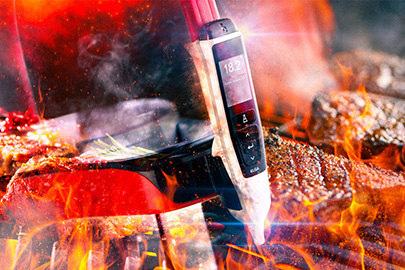Ist gegrilltes Fleisch gesundheitsschädlich?
6 out 2022
 Wird Fleisch bei hohen Temperaturen gegrillt und es tropft Fleischsaft und Fett auf die offene Flamme, können polyzyklische aromatische Kohlenwasserstoffe (PAK) entstehen. PAKs gelten als wahrscheinlich krebserregend, weshalb sich eine Studie mit der Bioverfügbarkeit dieser Stoffe beschäftigt.
Wird Fleisch bei hohen Temperaturen gegrillt und es tropft Fleischsaft und Fett auf die offene Flamme, können polyzyklische aromatische Kohlenwasserstoffe (PAK) entstehen. PAKs gelten als wahrscheinlich krebserregend, weshalb sich eine Studie mit der Bioverfügbarkeit dieser Stoffe beschäftigt.
Polyzyklische aromatische Kohlenwasserstoffe (PAK) sind Chemikalien, die entstehen, wenn Fleisch bei hohen Temperaturen gegart wird – wenn beim Braten, Frittieren oder Grillen Fett und Säfte auf Flammen tropfen. Diese Stoffe können auch bei anderen Lebensmittelzubereitungsprozessen wie Trocknen und Räuchern entstehen.
Die Belastung durch diätetische PAK gewinnt an Bedeutung aufgrund des Risikos, das diese Chemikalien für die menschliche Gesundheit darstellen können. In Laborexperimenten wurde festgestellt, dass PAK Veränderungen in der DNA verursachen, die das Krebsrisiko erhöhen können. Aus diesem Grund hat die Internationale Agentur für Krebsforschung (IARC) einige dieser Chemikalien als möglicherweise oder wahrscheinlich krebserregend für den Menschen eingestuft.
Die Beurteilung der Menge einer Substanz, die während des Verdauungsprozesses aus Lebensmitteln in den Magen-Darm-Trakt freigesetzt wird – oder ihre Bioverfügbarkeit – ist ein wichtiges Instrument zur Messung ihres potenziellen Gesundheitsrisikos. Derzeit fehlen jedoch Informationen zur Bioverfügbarkeit von PAK in gegrilltem Fleisch.
Messung der Biozugänglichkeit
In einer neuen Studie, die im International Journal of Environmental Research and Public Health veröffentlicht wurde, bewerteten Wissenschaftler die Bioverfügbarkeit von PAK in gegrilltem Hähnchen und Rindfleisch mit unterschiedlichem Gargrad (Garzeit) in verschiedenen Teilen des Magen-Darm-Trakts.1 Sie untersuchten auch die Beziehung zwischen dem Fettgehalt von gegrilltem Fleisch und der Bioverfügbarkeit dieser Substanzen.
Die Forscher maßen 15 PAK in gegrillten Hähnchen- und Rindfleischproben mittels Hochleistungsflüssigkeitschromatographie (HPLC) – vor und nach der Verdauung mit Speichel, Magen-, Darm- und Gallensäften.
Das Team fand 30,73 ng/g Gesamt-PAHs in Rindfleisch und 70,93 ng/g Gesamt-PAKs in Huhn vor der Verdauung. Die Bioverfügbarkeit der PAKs variierte zwischen gegrilltem Rindfleisch und Hähnchen, wobei diejenigen in gegrilltem Rindfleisch eine relativ höhere Bioverfügbarkeit aufwiesen. Die höchste Bioverfügbarkeit dieser Substanzen war nach Magenverdauung, gefolgt von Darm- und dann Speichelverdauung. Zudem stieg die Bioverfügbarkeit von PAK mit zunehmendem Gargrad – und sie korrelierten positiv mit dem Fettgehalt von gegrilltem Fleisch.
Die Forscher verwendeten für ihre Experimente Reinstwasser, das von einem ELGA PURELAB®-Laborwassersystem erzeugt wurde, und minimierten so das Risiko der Zugabe von Verunreinigungen, die ihre Ergebnisse beeinträchtigen könnten.
Mögliche langfristige Risiken
Der Verzehr von gegrilltem und geräuchertem Fleisch trägt einen erheblichen Anteil zur gesamten Nahrungsaufnahme von PAK bei, da diese Lebensmittel immer beliebter werden. Die Forscher schätzten die tägliche Nahrungsaufnahme (DI) von PAK durch den Verzehr von gegrilltem Rindfleisch und Hähnchen. Die Aufnahme der PAK wird auch vom Gargrad des Fleisches beeinflusst. Der Verzehr von gegrilltem Fleisch könnte also tatsächlich ein Krebsrisiko darstellen.
Insgesamt tragen diese Ergebnisse dazu bei, den Einfluss von Gargrad und Fettgehalt des Fleisches auf die Bioverfügbarkeit und Bioakkumulation von PAK aufzuzeigen. Diese Erkenntnisse sollten in die Bewertung des Gesundheitsrisikos beim Verzehr von gegrilltem Fleisch einfließen.
Warum ELGA LabWater wählen
ELGA LabWater ist seit 1937 ein vertrauenswürdiger Name für Rein- und Reinstwasser. Wir bieten eine ganzheitliche Auswahl an Wasseraufbereitungslösungen, unterstützt durch exzellenten Service und Support.
Bleiben Sie informiert!
Alles über wichtige Normen, neue Technologien und smarte Lösungen für Ihre Wasseraufbereitung.
Quelle:
- Hamidi EN, et al. Bioverfügbarkeit von polyzyklischen aromatischen Kohlenwasserstoffen (PAKs) in gegrilltem Fleisch: Die Auswirkungen von Fleischgare und Fettgehalt. Int J Environ Res Public Health 2022;19(2):736 https://doi.org/10.3390/ijerph19020736
